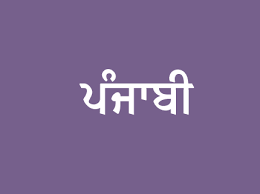Language/Panjabi/Grammar/Nouns-and-Pronouns
Welcome to the lesson on Nouns and Pronouns in Panjabi! In this lesson, we will cover the basics of nouns and pronouns, their usage, and some interesting cultural information related to these topics.
With the completion of this lesson, consider investigating these related pages: 0 to A1 Course & Gurmukhi Matra.
Nouns
Nouns are words that refer to people, places, things, or ideas. In Panjabi, nouns can be masculine or feminine. Unlike English, there is no neuter gender in Panjabi.
Gender in Nouns
The gender of a noun in Panjabi is not always related to the biological gender of the noun. Some common gender markers in Panjabi are:
- Masculine: ਓ (o), ਆ (aa), ਅੰ (an)
- Feminine: ਇ (i), ਈ (ee), ਏ (ai)
For example:
| Panjabi | Pronunciation | English |
|---|---|---|
| ਪੁੱਤਰ | puttar | son |
| ਪੁੱਤਰੀ | puttari | daughter |
As you can see from the table above, the word for "son" is masculine and the word for "daughter" is feminine. In general, words ending in the masculine markers (o, aa, an) are masculine, and words ending in the feminine markers (i, ee, ai) are feminine. However, there are many exceptions to this rule, so it's important to memorize the gender of each noun.
Plurals in Nouns
In Panjabi, plural nouns are formed by adding the suffix -ਆਂ (-aan) to the singular form of the noun. However, there are many irregular plural forms that do not follow this rule, so it's important to memorize the plural form of each noun.
For example:
| Panjabi | Pronunciation | English |
|---|---|---|
| ਕਿਤਾਬ | kitaab | book (singular) |
| ਕਿਤਾਬਾਂ | kitaabaan | books (plural) |
As you can see from the table above, the singular form of the word for "book" is ਕਿਤਾਬ (kitaab) and the plural form is ਕਿਤਾਬਾਂ (kitaabaan).
Pronouns
Pronouns are words that take the place of nouns in a sentence. In Panjabi, there are several types of pronouns, including personal pronouns, possessive pronouns, demonstrative pronouns, interrogative pronouns, and indefinite pronouns.
Personal Pronouns
Personal pronouns are used to refer to people or things. In Panjabi, personal pronouns have different forms depending on whether they are in the subject or object position, and whether they are singular or plural.
Here are the subject and object forms of the personal pronouns in Panjabi:
| Person | Subject Pronoun | Object Pronoun |
|---|---|---|
| 1st Singular | ਮੈਂ (main) | ਮੈਂ (main) |
| 2nd Singular (informal) | ਤੂੰ (toon) | ਤੈਨੂੰ (tainu) |
| 2nd Singular (formal) | ਤੁਸੀਂ (tuseen) | ਤੁਆਨੂੰ (tuhanu) |
| 3rd Singular (masculine) | ਉਹ (uh) | ਉਹਨੂੰ (uhnu) |
| 3rd Singular (feminine) | ਉਹ (uh) | ਉਸਨੂੰ (usnu) |
| 1st Plural | ਅਸੀਂ (aseen) | ਸਾਨੂੰ (saanu) |
| 2nd Plural | ਤੁਸੀਂ (tuseen) | ਤੁਸੀਂਆਂ (tuseenaan) |
| 3rd Plural | ਉਹ (uh) | ਉਹਨੂੰ (uhnaan) |
Here are some example sentences using personal pronouns:
- ਮੈਂ ਪੰਜਾਬੀ ਬੋਲਦਾ ਹਾਂ। (Main Panjabi bolda haan.) - I speak Panjabi.
- ਤੁਸੀਂ ਕਿਹੜੇ ਸ਼ਹਿਰ ਤੋਂ ਹੋ? (Tuseen kihde shahir ton ho?) - Where are you from?
- ਉਹ ਮੇਰਾ ਦੋਸਤ ਹੈ। (Uh meraa dost hai.) - He is my friend.
- ਸਾਨੂੰ ਇਥੇ ਰਹਿਣਾ ਪਸੰਦ ਹੈ। (Saanu ithe rahinaa pasand hai.) - We like to live here.
Possessive Pronouns
Possessive pronouns are used to show ownership or possession. In Panjabi, possessive pronouns agree in gender and number with the noun they modify.
Here are the possessive pronouns in Panjabi:
| Person | Singular | Plural |
|---|---|---|
| 1st | ਮੇਰਾ (meraa) | ਸਾਡਾ (saada) |
| 2nd (informal) | ਤੇਰਾ (teraa) | ਤੁਹਾਡਾ (tuhaada) |
| 2nd (formal) | ਆਪਣਾ (apanaa) | ਤੁਹਾਡਾ (tuhaada) |
| 3rd (masculine) | ਉਸਦਾ (usda) | ਉਨ੍ਹਾਂਦਾ (unhaanda) |
| 3rd (feminine) | ਉਸਦੀ (usdi) | ਉਨ੍ਹਾਂਦੀ (unhaandi) |
| 3rd (neuter) | ਉਸਦਾ (usda) | ਉਨ੍ਹਾਂਦਾ (unhaanda) |
Here are some example sentences using possessive pronouns:
- ਮੈਂ ਆਪਣੀ ਕਿਤਾਬ ਲਿਆ। (Main apani kitaab liaa.) - I took my book.
- ਉਹ ਉਸਦੇ ਘਰ ਵਿੱਚ ਹੈ। (Uh usde ghar vich hai.) - He is in his house.
- ਣਾ ਤੇਰਾ ਦੋਸਤ ਹੈ। (Rinaa teraa dost hai.) - Rina is your friend.
Demonstrative Pronouns
Demonstrative pronouns are used to point to a specific person, place, or thing. In Panjabi, there are two types of demonstrative pronouns: this/these (ਇਹ, ih) and that/those (ਉਹ, uh).
Here are some example sentences using demonstrative pronouns:
- ਇਹ ਘਰ ਮੇਰਾ ਹੈ। (Ih ghar meraa hai.) - This house is mine.
- ਉਹ ਆਦਮੀ ਬਹੁਤ ਤੇਜ ਚੱਲਦਾ ਹੈ। (Uh aadami bahut tez chaldaa hai.) - That man walks very fast.
Interrogative Pronouns
Interrogative pronouns are used to ask questions. In Panjabi, the interrogative pronouns are:
- ਕਿਹੜਾ (kihrraa) - which
- ਕੀ (kee) - what
- ਕਿਹਾਂ (kiaan) - where
- ਕਿਉਂ (kioun) - why
Here are some example sentences using interrogative pronouns:
- ਕਿਹੜਾ ਪੰਜਾਬੀ ਸ਼ਬਦ ਤੁਸੀਂ ਜਾਣਦੇ ਹੋ? (Kihrraa panjabi shabad tuseen jaande ho?) - Which Panjabi word do you know?
- ਤੁਸੀਂ ਕੀ ਕਰਦੇ ਹੋ? (Tuseen kee karday ho?) - What do you do?
- ਕਿਹਾਂ ਤੁਸੀਂ ਰਹਿੰਦੇ ਹੋ? (Kiaan tuseen rahinday ho?) - Where do you live?
Indefinite Pronouns
Indefinite pronouns are used to talk about people, places, or things without specifying them individually. In Panjabi, the
Other Lessons
- How to Use Be
- Pronouns
- Adjectives and Adverbs
- Past Tense
- Likes and Dislikes
- Conjunctions
- Nouns
- Gurmukhi Matra
- Gender

